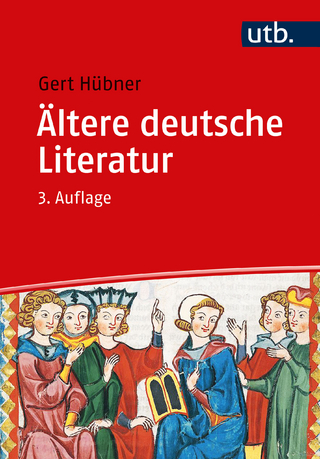
Jankyn's Book of Wikked Wyves
Seven Commentaries on Walter Map's ""Dissuasio Valerii
Seiten
2014
University of Georgia Press (Verlag)
978-0-8203-4610-6 (ISBN)
University of Georgia Press (Verlag)
978-0-8203-4610-6 (ISBN)
- Lieferbar (Termin unbekannt)
- Versandkostenfrei innerhalb Deutschlands
- Auch auf Rechnung
- Verfügbarkeit in der Filiale vor Ort prüfen
- Artikel merken
In Volume One of Jankyn’s Book of Wikked Wyves (Georgia, 1997), Ralph Hanna and Traugott Lawler presented authoritative versions of three medieval texts invoked by Jankyn (fifth husband of the Wife of Bath) in The Canterbury Tales. In Volume Two, Lawler and Hanna revisit one of those texts by way of presenting all the known contemporary commentaries on it.
In volume 1 of Jankyn’s Book of Wikked Wyves (Georgia, 1997), Ralph Hanna and Traugott Lawler presented authoritative versions of three medieval texts invoked by Jankyn (fifth husband of the Wife of Bath) in The Canterbury Tales. In Jankyn’s Book, volume 2, Lawler and Hanna revisit one of those texts by way of presenting all the known contemporary commentaries on it.
The text is Walter Map’s Dissuasio Valerii, that is, “The Letter of Valerius to His Friend Ruffinus, Dissuading Him from Marrying.” Included in Jankyn’s Book, volume 2, are seven commentaries on Dissuasio Valerii, edited from all known manuscripts and presented in their Latin text with English translation on the facing page. Each commentary opens with a headnote. Variants are reported at the bottom of the translation pages and full explanatory notes appear after the texts, along with a bibliography and index of sources.
In their introduction, Lawler and Hanna discuss what is known about the authors of the commentaries. Four are unknown, although one of these is almost certainly a Dominican. Of the three known authors, two are Dominicans (Eneas of Siena and the brilliant Englishman Nicholas Trivet) and one is Franciscan (John Ridewall). In addition, the editors discuss the likely readerships of the commentaries - the four humanist texts, which explicate Map’s witty and allusive Latin and which were for use in school and the three moralising texts, which mount eloquent defences of women and which were for use mainly by the clergy.
While Lawler and Hanna’s immediate aim is to give readers of Chaucer the fullest possible background for understanding his satire on antifeminism in “The Wife of Bath’s Prologue,” the Dissuasio Valerii commentaries extend significantly our understanding of medieval attitudes, in general, toward women and marriage.
In volume 1 of Jankyn’s Book of Wikked Wyves (Georgia, 1997), Ralph Hanna and Traugott Lawler presented authoritative versions of three medieval texts invoked by Jankyn (fifth husband of the Wife of Bath) in The Canterbury Tales. In Jankyn’s Book, volume 2, Lawler and Hanna revisit one of those texts by way of presenting all the known contemporary commentaries on it.
The text is Walter Map’s Dissuasio Valerii, that is, “The Letter of Valerius to His Friend Ruffinus, Dissuading Him from Marrying.” Included in Jankyn’s Book, volume 2, are seven commentaries on Dissuasio Valerii, edited from all known manuscripts and presented in their Latin text with English translation on the facing page. Each commentary opens with a headnote. Variants are reported at the bottom of the translation pages and full explanatory notes appear after the texts, along with a bibliography and index of sources.
In their introduction, Lawler and Hanna discuss what is known about the authors of the commentaries. Four are unknown, although one of these is almost certainly a Dominican. Of the three known authors, two are Dominicans (Eneas of Siena and the brilliant Englishman Nicholas Trivet) and one is Franciscan (John Ridewall). In addition, the editors discuss the likely readerships of the commentaries - the four humanist texts, which explicate Map’s witty and allusive Latin and which were for use in school and the three moralising texts, which mount eloquent defences of women and which were for use mainly by the clergy.
While Lawler and Hanna’s immediate aim is to give readers of Chaucer the fullest possible background for understanding his satire on antifeminism in “The Wife of Bath’s Prologue,” the Dissuasio Valerii commentaries extend significantly our understanding of medieval attitudes, in general, toward women and marriage.
Traugott Lawler is a professor emeritus of English at Yale University. His books include The One and the Many in the Canterbury Tales. Ralph Hanna is senior research officer on the Faculty of English Language and Literature at the University of Oxford. His books include Pursuing History and London Literature, 1300–1380.
| Reihe/Serie | Chaucer Library Series |
|---|---|
| Zusatzinfo | 1 black & white photograph, 2 figures |
| Verlagsort | Georgia |
| Sprache | englisch |
| Maße | 156 x 235 mm |
| Gewicht | 958 g |
| Themenwelt | Geschichte ► Allgemeine Geschichte ► Mittelalter |
| Geisteswissenschaften ► Sprach- / Literaturwissenschaft ► Anglistik / Amerikanistik | |
| Geisteswissenschaften ► Sprach- / Literaturwissenschaft ► Literaturwissenschaft | |
| Sozialwissenschaften ► Soziologie | |
| ISBN-10 | 0-8203-4610-1 / 0820346101 |
| ISBN-13 | 978-0-8203-4610-6 / 9780820346106 |
| Zustand | Neuware |
| Haben Sie eine Frage zum Produkt? |
Mehr entdecken
aus dem Bereich
aus dem Bereich
eine neue Geschichte des Mittelalters
Buch | Hardcover (2023)
C.H.Beck (Verlag)
38,00 €


